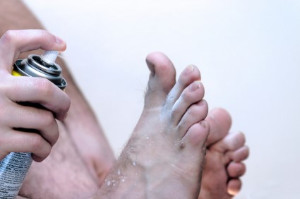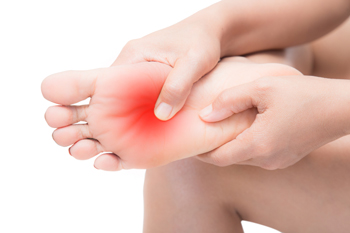Blog
Items filtered by date: January 2021
Is It Dry Skin or Athlete's Foot?
Both dry skin and athlete’s foot are conditions that can affect the skin of the feet. Dry skin is characterized by a rough, flaky, or scaly texture and possible cracking, itchiness, irritation or redness. Athlete’s foot is a fungal infection of the skin of the feet and is characterized by red, itchy scales on the feet, a burning or stinging sensation, cracking or flaking skin, oozing blisters, and changes in the texture or color of the toenails. Because both conditions can make the skin of the feet dry, itchy, or irritated, it can sometimes be difficult to tell dry skin and athlete’s foot apart. For this reason, it is suggested that you seek the counsel of a podiatrist, who can determine the root of the problem and offer the appropriate treatments.
Athlete’s foot is an inconvenient condition that can be easily reduced with the proper treatment. If you have any concerns about your feet and ankles, contact Dr. Dean D. Hinners from Illinois. Our doctor will treat your foot and ankle needs.
Athlete’s Foot: The Sole Story
Athlete's foot, also known as tinea pedis, can be an extremely contagious foot infection. It is commonly contracted in public changing areas and bathrooms, dormitory style living quarters, around locker rooms and public swimming pools, or anywhere your feet often come into contact with other people.
Solutions to Combat Athlete’s Foot
- Hydrate your feet by using lotion
- Exfoliate
- Buff off nails
- Use of anti-fungal products
- Examine your feet and visit your doctor if any suspicious blisters or cuts develop
Athlete’s foot can cause many irritating symptoms such as dry and flaking skin, itching, and redness. Some more severe symptoms can include bleeding and cracked skin, intense itching and burning, and even pain when walking. In the worst cases, Athlete’s foot can cause blistering as well. Speak to your podiatrist for a better understanding of the different causes of Athlete’s foot, as well as help in determining which treatment options are best for you.
If you have any questions please feel free to contact one of our offices located in Metropolis and Eldorado, IL . We offer the newest diagnostic and treatment technologies for all your foot and ankle needs.
Is It Dry Skin or Athlete's Foot?
Both dry skin and athlete’s foot are conditions that can affect the skin of the feet. Dry skin is characterized by a rough, flaky, or scaly texture and possible cracking, itchiness, irritation or redness. Athlete’s foot is a fungal infection of the skin of the feet and is characterized by red, itchy scales on the feet, a burning or stinging sensation, cracking or flaking skin, oozing blisters, and changes in the texture or color of the toenails. Because both conditions can make the skin of the feet dry, itchy, or irritated, it can sometimes be difficult to tell dry skin and athlete’s foot apart. For this reason, it is suggested that you seek the counsel of a podiatrist, who can determine the root of the problem and offer the appropriate treatments.
Athlete’s foot is an inconvenient condition that can be easily reduced with the proper treatment. If you have any concerns about your feet and ankles, contact Dr. Dean D. Hinners from Illinois. Our doctor will treat your foot and ankle needs.
Athlete’s Foot: The Sole Story
Athlete's foot, also known as tinea pedis, can be an extremely contagious foot infection. It is commonly contracted in public changing areas and bathrooms, dormitory style living quarters, around locker rooms and public swimming pools, or anywhere your feet often come into contact with other people.
Solutions to Combat Athlete’s Foot
- Hydrate your feet by using lotion
- Exfoliate
- Buff off nails
- Use of anti-fungal products
- Examine your feet and visit your doctor if any suspicious blisters or cuts develop
Athlete’s foot can cause many irritating symptoms such as dry and flaking skin, itching, and redness. Some more severe symptoms can include bleeding and cracked skin, intense itching and burning, and even pain when walking. In the worst cases, Athlete’s foot can cause blistering as well. Speak to your podiatrist for a better understanding of the different causes of Athlete’s foot, as well as help in determining which treatment options are best for you.
If you have any questions please feel free to contact one of our offices located in Metropolis and Eldorado, IL . We offer the newest diagnostic and treatment technologies for all your foot and ankle needs.
Read more about Athlete's FootArthritis Can Cause Pain in the Feet and Ankles
Arthritis Can Cause Pain in the Feet and Ankles
Pain in the Forefoot
The forefoot refers to the front part of the foot and includes the metatarsal bones, toe bones, and their connective tissues. There are many different conditions which could cause pain in the forefoot. Metatarsalgia is a general term used to refer to pain and tenderness in the ball of the foot. Potential causes of metatarsalgia include toe misalignment, arthritis, or wearing poorly fitted shoes. Sesamoiditis is a painful inflammation of the sesamoid bones located beneath the big toe joint. Morton’s neuroma is a painful condition caused by a pinched nerve between the toes. Toe pain may be caused by arthritis, bunions, hammertoes, or gout. If you have any pain in your forefoot, it is suggested that you consult with a podiatrist, who can diagnose the problem and offer effective treatments.
Foot Pain
Foot pain can be extremely painful and debilitating. If you have a foot pain, consult with Dr. Dean D. Hinners from Illinois. Our doctor will assess your condition and provide you with quality foot and ankle treatment.
Causes
Foot pain is a very broad condition that could be caused by one or more ailments. The most common include:
- Bunions
- Hammertoes
- Plantar Fasciitis
- Bone Spurs
- Corns
- Tarsal Tunnel Syndrome
- Ingrown Toenails
- Arthritis (such as Gout, Rheumatoid, and Osteoarthritis)
- Flat Feet
- Injury (from stress fractures, broken toe, foot, ankle, Achilles tendon ruptures, and sprains)
- And more
Diagnosis
To figure out the cause of foot pain, podiatrists utilize several different methods. This can range from simple visual inspections and sensation tests to X-rays and MRI scans. Prior medical history, family medical history, and any recent physical traumatic events will all be taken into consideration for a proper diagnosis.
Treatment
Treatment depends upon the cause of the foot pain. Whether it is resting, staying off the foot, or having surgery; podiatrists have a number of treatment options available for foot pain.
If you have any questions, please feel free to contact one of our offices located in Metropolis and Eldorado, IL . We offer the newest diagnostic and treatment technologies for all your foot care needs.
Pain in the Forefoot
The forefoot refers to the front part of the foot and includes the metatarsal bones, toe bones, and their connective tissues. There are many different conditions which could cause pain in the forefoot. Metatarsalgia is a general term used to refer to pain and tenderness in the ball of the foot. Potential causes of metatarsalgia include toe misalignment, arthritis, or wearing poorly fitted shoes. Sesamoiditis is a painful inflammation of the sesamoid bones located beneath the big toe joint. Morton’s neuroma is a painful condition caused by a pinched nerve between the toes. Toe pain may be caused by arthritis, bunions, hammertoes, or gout. If you have any pain in your forefoot, it is suggested that you consult with a podiatrist, who can diagnose the problem and offer effective treatments.
Foot Pain
Foot pain can be extremely painful and debilitating. If you have a foot pain, consult with Dr. Dean D. Hinners from Illinois. Our doctor will assess your condition and provide you with quality foot and ankle treatment.
Causes
Foot pain is a very broad condition that could be caused by one or more ailments. The most common include:
- Bunions
- Hammertoes
- Plantar Fasciitis
- Bone Spurs
- Corns
- Tarsal Tunnel Syndrome
- Ingrown Toenails
- Arthritis (such as Gout, Rheumatoid, and Osteoarthritis)
- Flat Feet
- Injury (from stress fractures, broken toe, foot, ankle, Achilles tendon ruptures, and sprains)
- And more
Diagnosis
To figure out the cause of foot pain, podiatrists utilize several different methods. This can range from simple visual inspections and sensation tests to X-rays and MRI scans. Prior medical history, family medical history, and any recent physical traumatic events will all be taken into consideration for a proper diagnosis.
Treatment
Treatment depends upon the cause of the foot pain. Whether it is resting, staying off the foot, or having surgery; podiatrists have a number of treatment options available for foot pain.
If you have any questions, please feel free to contact one of our offices located in Metropolis and Eldorado, IL . We offer the newest diagnostic and treatment technologies for all your foot care needs.
Read more about Foot PainWhat Should I Do About My Child's Smelly Feet?
Foot odor can be common among children and adolescents. When children’s feet sweat, bacteria that thrive in moist, dark environments, like their shoes, can begin to multiply rapidly. Bacteria eats dead skin cells and releases waste in the form of organic acids, often producing a strong and unpleasant smell. Fortunately, there are things that you can do at home to reduce foot odor. Encourage your child to wash and dry their feet thoroughly each day. Make sure that they wear properly fitted shoes made of breathable materials and clean, moisture-wicking socks to reduce sweat. Kill the bacteria in their shoes using a disinfectant spray. If foot odor does not improve with at home treatments, it is suggested that you take your child to see a podiatrist.
Making sure that your children maintain good foot health is very important as they grow. If you have any questions, contact Dr. Dean D. Hinners of Illinois. Our doctor can provide the care you need to keep you pain-free and on your feet.
Keeping Children's Feet Healthy
Having healthy feet during childhood can help prevent medical problems later in life, namely in the back and legs. As children grow, their feet require different types of care. Here are some things to consider...
Although babies do not walk yet, it is still very important to take care of their feet.
Avoid putting tight shoes or socks on his or her feet.
Allow the baby to stretch and kick his or her feet to feel comfortable.
As a toddler, kids are now on the move and begin to develop differently. At this age, toddlers are getting a feel for walking, so don’t be alarmed if your toddler is unsteady or ‘walks funny’.
As your child gets older, it is important to teach them how to take care of their feet.
Show them proper hygiene to prevent infections such as fungus.
Be watchful for any pain or injury.
Have all injuries checked by a doctor as soon as possible.
Comfortable, protective shoes should always be worn, especially at play.
If you have any questions please feel free to contact one of our offices located in Metropolis and Eldorado, IL . We offer the newest diagnostic and treatment technologies for all your foot and ankle needs.
What Should I Do About My Child's Smelly Feet?
Foot odor can be common among children and adolescents. When children’s feet sweat, bacteria that thrive in moist, dark environments, like their shoes, can begin to multiply rapidly. Bacteria eats dead skin cells and releases waste in the form of organic acids, often producing a strong and unpleasant smell. Fortunately, there are things that you can do at home to reduce foot odor. Encourage your child to wash and dry their feet thoroughly each day. Make sure that they wear properly fitted shoes made of breathable materials and clean, moisture-wicking socks to reduce sweat. Kill the bacteria in their shoes using a disinfectant spray. If foot odor does not improve with at home treatments, it is suggested that you take your child to see a podiatrist.
Making sure that your children maintain good foot health is very important as they grow. If you have any questions, contact Dr. Dean D. Hinners of Illinois. Our doctor can provide the care you need to keep you pain-free and on your feet.
Keeping Children's Feet Healthy
Having healthy feet during childhood can help prevent medical problems later in life, namely in the back and legs. As children grow, their feet require different types of care. Here are some things to consider...
Although babies do not walk yet, it is still very important to take care of their feet.
Avoid putting tight shoes or socks on his or her feet.
Allow the baby to stretch and kick his or her feet to feel comfortable.
As a toddler, kids are now on the move and begin to develop differently. At this age, toddlers are getting a feel for walking, so don’t be alarmed if your toddler is unsteady or ‘walks funny’.
As your child gets older, it is important to teach them how to take care of their feet.
Show them proper hygiene to prevent infections such as fungus.
Be watchful for any pain or injury.
Have all injuries checked by a doctor as soon as possible.
Comfortable, protective shoes should always be worn, especially at play.
If you have any questions please feel free to contact one of our offices located in Metropolis and Eldorado, IL . We offer the newest diagnostic and treatment technologies for all your foot and ankle needs.
Read more about How to Care for Your Child's FeetNerves Affected by Peripheral Neuropathy
Peripheral neuropathy is a condition in which the nerves of the peripheral nervous system become damaged or diseased. These nerves are responsible for sending messages from the brain and spinal cord to the rest of the body. The nerves of the feet are often affected as well. Every nerve in your peripheral system has a specific function. Motor nerve neuropathy affects the nerves responsible for muscle movement, while sensory neuropathy affects the nerves responsible for feeling sensation. Autonomic nerves control functions such as blood pressure, heart rate, and digestion. Symptoms vary based on the type of neuropathy that you have. Broadly, the symptoms one might experience due to peripheral neuropathy include burning, prickling, or tingling sensations in the feet, sharp pains, numbness, and muscle weakness. If you think that you are afflicted with peripheral neuropathy in your feet, it is suggested that you see a podiatrist for treatment.
Neuropathy
Neuropathy can be a potentially serious condition, especially if it is left undiagnosed. If you have any concerns that you may be experiencing nerve loss in your feet, consult with Dr. Dean D. Hinners from Illinois. Our doctor will assess your condition and provide you with quality foot and ankle treatment for neuropathy.
What Is Neuropathy?
Neuropathy is a condition that leads to damage to the nerves in the body. Peripheral neuropathy, or neuropathy that affects your peripheral nervous system, usually occurs in the feet. Neuropathy can be triggered by a number of different causes. Such causes include diabetes, infections, cancers, disorders, and toxic substances.
Symptoms of Neuropathy Include:
- Numbness
- Sensation loss
- Prickling and tingling sensations
- Throbbing, freezing, burning pains
- Muscle weakness
Those with diabetes are at serious risk due to being unable to feel an ulcer on their feet. Diabetics usually also suffer from poor blood circulation. This can lead to the wound not healing, infections occurring, and the limb may have to be amputated.
Treatment
To treat neuropathy in the foot, podiatrists will first diagnose the cause of the neuropathy. Figuring out the underlying cause of the neuropathy will allow the podiatrist to prescribe the best treatment, whether it be caused by diabetes, toxic substance exposure, infection, etc. If the nerve has not died, then it’s possible that sensation may be able to return to the foot.
Pain medication may be issued for pain. Electrical nerve stimulation can be used to stimulate nerves. If the neuropathy is caused from pressure on the nerves, then surgery may be necessary.
If you have any questions, please feel free to contact one of our offices located in Metropolis and Eldorado, IL . We offer the newest diagnostic and treatment technologies for all your foot care needs.
Read more about NeuropathyNerves Affected by Peripheral Neuropathy
Peripheral neuropathy is a condition in which the nerves of the peripheral nervous system become damaged or diseased. These nerves are responsible for sending messages from the brain and spinal cord to the rest of the body. The nerves of the feet are often affected as well. Every nerve in your peripheral system has a specific function. Motor nerve neuropathy affects the nerves responsible for muscle movement, while sensory neuropathy affects the nerves responsible for feeling sensation. Autonomic nerves control functions such as blood pressure, heart rate, and digestion. Symptoms vary based on the type of neuropathy that you have. Broadly, the symptoms one might experience due to peripheral neuropathy include burning, prickling, or tingling sensations in the feet, sharp pains, numbness, and muscle weakness. If you think that you are afflicted with peripheral neuropathy in your feet, it is suggested that you see a podiatrist for treatment.
Neuropathy
Neuropathy can be a potentially serious condition, especially if it is left undiagnosed. If you have any concerns that you may be experiencing nerve loss in your feet, consult with Dr. Dean D. Hinners from Illinois. Our doctor will assess your condition and provide you with quality foot and ankle treatment for neuropathy.
What Is Neuropathy?
Neuropathy is a condition that leads to damage to the nerves in the body. Peripheral neuropathy, or neuropathy that affects your peripheral nervous system, usually occurs in the feet. Neuropathy can be triggered by a number of different causes. Such causes include diabetes, infections, cancers, disorders, and toxic substances.
Symptoms of Neuropathy Include:
- Numbness
- Sensation loss
- Prickling and tingling sensations
- Throbbing, freezing, burning pains
- Muscle weakness
Those with diabetes are at serious risk due to being unable to feel an ulcer on their feet. Diabetics usually also suffer from poor blood circulation. This can lead to the wound not healing, infections occurring, and the limb may have to be amputated.
Treatment
To treat neuropathy in the foot, podiatrists will first diagnose the cause of the neuropathy. Figuring out the underlying cause of the neuropathy will allow the podiatrist to prescribe the best treatment, whether it be caused by diabetes, toxic substance exposure, infection, etc. If the nerve has not died, then it’s possible that sensation may be able to return to the foot.
Pain medication may be issued for pain. Electrical nerve stimulation can be used to stimulate nerves. If the neuropathy is caused from pressure on the nerves, then surgery may be necessary.
If you have any questions, please feel free to contact one of our offices located in Metropolis and Eldorado, IL . We offer the newest diagnostic and treatment technologies for all your foot care needs.






